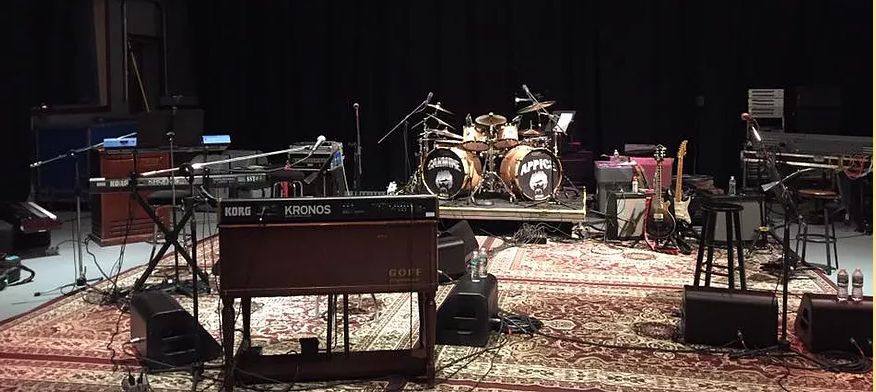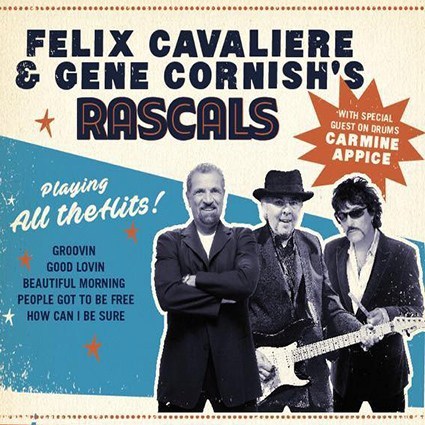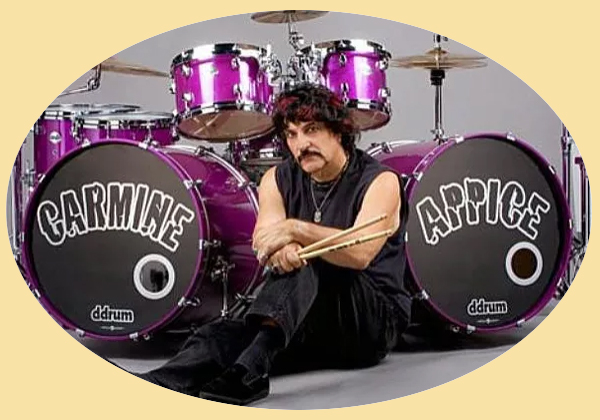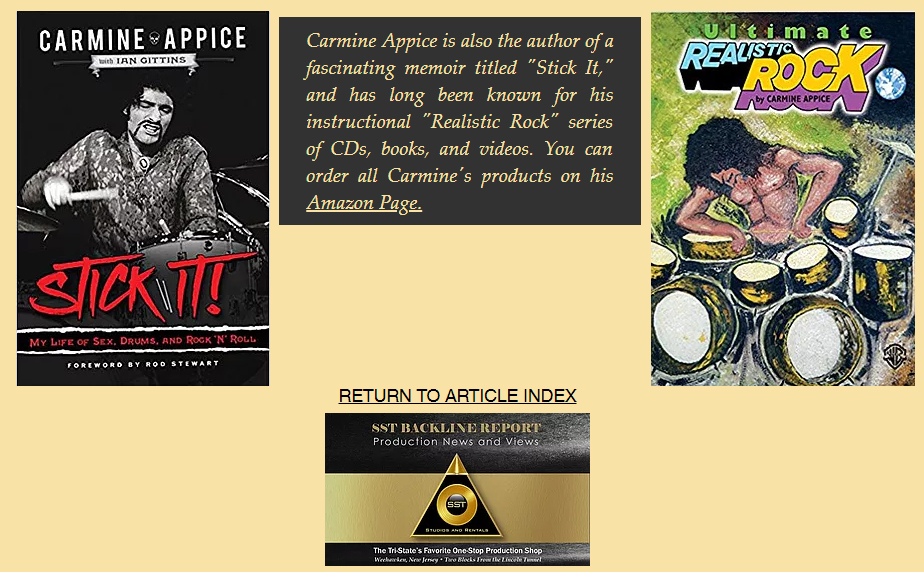This was written by my old friend, Steve Acker. Steve couldn’t play drums to save his life, but he is an accomplished guitarist, composer, recording artist and jingle writer. He works with SST Studio, a very large music facility in the NorthEast, where he caught up with drumming legend, Carmine Appice. Rock on, Steve! - George Lawrence, editor
We've seen our share of legends at SST in the past year, but few more legendary than Rock and Roll Hall of Famers, The Rascals. Original members Felix Cavaliere and Gene Cornish spent most of a week here in 2018, along with the equally legendary drummer, Carmine Appice (subbing for the ailing Dino Danelli). It was not the first time SST has hosted the Rascals. In 2013, just months after the waters of Superstorm Sandy virtually destroyed the room, Steve Van Zandt brought the band in to prepare for a planned Broadway production of "Once Upon a Dream." It was, at that time, a much-needed, and deeply-appreciated morale booster for all of us.
Carmine Appice first came to fame as the drummer for Vanilla Fudge. His ultra-heavy virtuosity and showmanship instantly elevated Appice to the upper stratosphere, where he remains to this day as one of rock's greatest drummers ever. He talked with us about the Rascals sessions and his new ventures.
SST: You recently worked at SST with the Rascals. Tell us about that. Why were you there? What was the project?
CA: We went to SST to rehearse for our tour last year. We worked there for five days. We recorded all the songs we did on the multi-track at SST, as well. It was great to work there. We had food every day. The room was great. The sound system was great. The sound of the room was great. We were there every day from like, ten to six. It was a very pleasurable experience.
SST: This was the original Rascals, all the original members except Dino Danelli?
CA: It was Gene and Felix's Rascals, together. Eddie Brigati was not in it.
SST: Are any of these recordings are going to be commercially released?
CA: Not that I know of. It was just for the rehearsal.
SST: Where did the tour take you?
CA: The tour got cut short, unfortunately, because of Gene Cornish’s health; he had a heart attack on stage. We had 18 gigs booked from July on, but we only did 12. We canceled six of them. We did play in Canada. We played Washington DC, Cleveland, Ohio, Long Island, and Connecticut, and Billings, Montana, to name a few. It went very well. The band played great. But we’re going to wait until March to see how Gene is feeling then. In the meantime, Felix is still going out on the road the way he always has -- as Felix's Rascals
SST: Getting back to the SST sessions, were you all playing and recording live in the studio?
CA: Totally live, totally live sound. No padded-up drums. I never do that, anyway. It was a totally live setup, right down to tape. We didn't do all the songs at once. We took one song at a time. We played it once and then we recorded it. By that time, we had rehearsed them all already.
SST: Were the vocals recorded live? How did you monitor the vocals in the room?
CA: It was all live. We had in-ear monitors, and we had monitors in the room as well.
SST: One of the great party records of all time is Good Lovin.' In fact, it’s one of the great rock records ever.
CA: Well, you know, that was first done by The Contours on Motown. They did it the same way. The organ part was the same. The Rascals did it and got a number one hit, but when the Contours did it, nothing happened. But it's almost the same.
SST: You and Dino Danelli started out at roughly the same time, did you know him then?
CA: I knew Dino before he made it in the Rascals, just from being on the scene. He taught me a few things about the drums. like how to put a shredded-up newspaper in your bass drum instead of a muffler so it didn't make the drum sound like a couch. It's a punchier sound. I got that from him. Then I saw him playing with his band, opening for Gene Krupa at the Metropole, and he was twirling his sticks, even then. He was a monster. I loved him. When he made it in the Rascals, he was amazing.
SST: Was he the first guy to popularize those moves?
CA: Well, Gene Krupa did all those moves. It goes down the line. Gene Krupa did it, I did it after Dino, and others did it after me. Everybody changes it a little and makes it their own.
SST: Vanilla Fudge emerged in what? 1966?
CA: 1967. I was 20. when we started making it. The Rascals came along around ‘65, about two years before us.
SST: Were they a heavy influence on you?
CA: Oh definitely,
SST: Having played in so many great bands, was it still particularly satisfying to play with the Rascals?
CA: Oh yes. I have never really changed my style much in all the bands I've played with. It's just a matter of how hard or soft I play, volume wise. With the Rascals, I was going for that old drum sound. So many sound guys want to put me behind a screen because I've got some loud cymbals, but I always say "I'm not going to go behind a screen. It's ridiculous." The sound we were getting at SST was the old Rascals drum sound that they had on record. That's the sound that I had on my drums.
SST: Do you do use room mikes much? Jimmy Page used to put mics all over the room to get that live John Bonham sound.
CA: Yea, yea, we did that before Zeppelin. you know. We came out first with that. I still do it. I use room mics differently now. though. Now I keep the mics low and put a baffle in front of them, so it knocks out some of the top end on the cymbals.
SST: So, what's next on your calendar?
CA: I'm promoting my Guitar Zeus album on Spotify. I've got it on CD and on vinyl so I'm going to be promoting that through February. In March, I’ve got some dates with Vanilla Fudge. Right now, the dates are scattered. I'm working on some other stuff that might kick up the whole summer.
SST: It sounds like you're working as hard as you ever have.
CA: Not really. I don't go on long tours anymore; they're more like weekend gigs. I'm concentrating now on putting together a public speaking program to do speaking gigs. I've always wanted to do that. My first one is this week. I have an agent now who's going to help me do it. The subjects will be how I survived in the music business, life lessons that I've learned, how to take an idea and develop it and turn it into something. Positive thinking--motivational speaking.
SST: Are you hoping to reach younger musicians with these speeches?
CA: No, this is corporate speaking I'm talking about. I've done thousands of drum clinics, but they're not doing so well anymore because the music on the radio is not rock music anymore. It goes down the line. It's a domino effect, so it affects all the clinics. I've done clinics since 1971. The next thing is to take it up a notch and do the motivational speaking. Same thing, but with different subject matter.
Editor’s note: As I edit and post this article, I’m listening to Carmine’s Guitar Zeus album which features many, many of the greatest guitarists in the world. Great album and Carmine is spot on - hasn’t lost his touch! Passionate drumming! - George Lawrence




